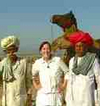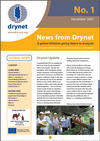Pastoralists seek recognition as stewards of biodiversity

The United Nations Convention on Biological Diversity commits it signatory countries to protect and encourage customary use of biological resources in accordance with traditional cultural practices that are compatible with conservation and sustainable use requirements (Article 10c).

Many traditional pastoralist communities would qualify for support by their governments. Alas, in reality, they are generally ignored or scorned upon by policy makers.
On 19-23 May 2008, the government parties to the Convention will meet in Bonn, Germany, to discuss progress in implementing the Convention.
Parallel to the official meetings, a Planet Diversity event will bring together grassroots organizations that promote cultural and biological diversity.
The League for Pastoral Peoples and Endogenous Livestock Development and Lokhit Pashu-Palak Sansthan (India) will use the opportunity to lobby for an official acknowledgment of the role of pastoralists in conserving various aspects of biodiversity, including those of domestic animals, certain wild plants and animals, as well as landscapes.
LPP and its partners have gained allies among shepherds in Germany, who often get paid to herd sheep on land to maintain its biodiversity. Another strong supporter is the LIFE Network for community-based conservation of animal genetic resources.
More information
- Convention on Biological Diversity (official government meetings)
- Planet Diversity (parallel event)
German TV features Raika

The Raika camel pastoralists of Rajasthan were featured on the German TV travel programme VOXTours on 26 January 2008.
The programme highlighted the work of LPP project coordinator Ilse Koehler-Rollefson and LPP’s partner organization Lokhit Pashu-Palak Sansthan to develop alternative sources of income for the Raika.
Environmental service payments for pastoralists?

An article in the first issue of News from Drynet contains a call for rewarding pastoralists for their environmental services.
The article, by LPP’s Ilse Koehler-Rollefson, stresses the need to maintain livestock diversity. “Studies have shown that drylands have produced a disproportionately high number of well known breeds which are basically the result of the efforts and the indigenous knowledge of pastoralists,” says Ilse.
“Scientific programmes to increase drought resistance of organisms are funded with millions of dollars,” she says. “Yet the day-to-day efforts of pastoralists to keep and develop animals under drought conditions and thereby sustain crucial gene pools – that will prove priceless during climate change – remain entirely unrewarded.”
The Drynet project, funded by the European Union, involves 14 partner organizations around the world.
Download newsletter 1.2 Mb
- Go to the previous page
- 1
- …
- 52
- 53
- 54
- 55
- 56
- 57
- 58
- …
- 76
- Go to the next page
